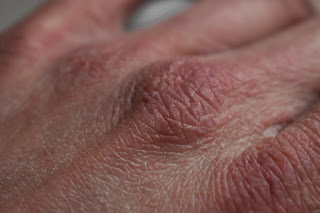 |
| Dry skin of a human hand |
The cold and dry winds of winter outdoors can cause your skin to turn red, become chapped and itch. Heated dry indoor air adds to these problems. If you have eczema, winter environments can exacerbate your symptoms. An older person’s skin has less collagen and elastin, making it less able to recover from these common winter problems. Here are a few strategies for combating skin discomfort during the winter season.
- Take long warm baths or showers, followed by a moisturizer
Hot water may feel good on itchy skin, but it brings blood to the surface and increases inflammation. That’s why the temperature of your soak is important. Warm, not hot. Stay in the water for 5-15 minutes.
Wash your skin gently with unscented soap and a soft washcloth. Fragrances and dyes can irritate skin, and loofahs and shower scrunchies do even more damage. Apply a moisturizer as soon as you have patted yourself dry to lock in the moisture you just soaked in.
- Moisturize often
Moisturizers contain oil to add to your skin’s natural barrier that keeps moisture in and irritants like germs and pollen out. Of the various forms of moisturizers, creams and ointments contain more oil than lotions, and thus do a more effective job. If you prefer the feel of a fast-absorbing lotion, be sure to put it on more frequently. You can purchase small bottles to keep in your desk or purse, and by the kitchen sink, so that you can apply more moisturizer whenever you feel itchy.
- Find the best moisturizer for your skin
If you will be spending time outdoors, use a moisturizer with sunscreen. Sunburns make skin conditions worse. Be sure you are covered with at least SPF 30 on any skin exposed to the air. Don’t forget your lips, they need sun protection also.
One helpful ingredient to check for in your moisturizer is ceramide. These chemicals are naturally found in healthy skin. Don’t be discouraged if, over time, one brand of moisturizer starts to become less effective. Switch brands until you find another one that works well.
- Try anti-itch products to aid sleeping
Calamine lotion contains zinc that acts as an anti-inflammatory. Antihistamines won’t actually stop the itching, but their sedative effect can aid sleep that is disturbed by itchiness. Be sure to consult your doctor before using any new medication.
- Wet wraps and ice packs are old-fashioned remedies, but they can be effective
Dampen fabric or gauze with warm water. Wrap the fabric around the inflamed area. You can even enclose it in plastic wrap to keep bedding dry if used to aid sleep. During the day, try an ice pack wrapped in a towel to reduce inflammation.
No comments:
Post a Comment
Got a Comment?